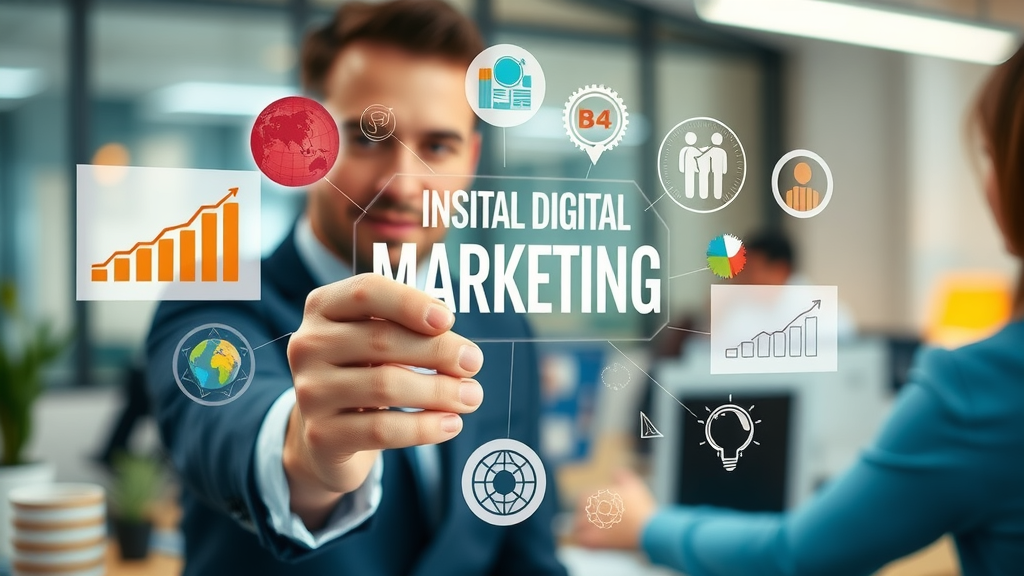Did you know that companies are expected to spend over $470 billion on digital marketing tools by 2025? This startling statistic underscores the increasingly vital role these tools play in modern marketing strategies. In an arena where innovation is constant and the stakes are ever-growing, understanding the diverse array of digital marketing tools available is imperative for anyone looking to remain competitive.
Unlocking the Potential of Digital Marketing Tools
Digital marketing tools have revolutionized how businesses execute their marketing strategies. These tools provide marketers with the ability to streamline processes, analyze performance metrics, and achieve greater engagement with their target audience. With countless options available, it's essential to know which tools can provide the best return on investment and align with your business goals.
The Evolution of Digital Marketing Tools

The landscape of digital marketing tools has dramatically evolved over the past two decades. Initially, tools were basic, focusing mainly on email marketing and simple data analysis. Today, however, businesses have access to advanced analytics tools, sophisticated social media management platforms, and comprehensive SEO applications. These innovations have paved the way for more strategic marketing efforts, providing valuable insights that drive decision-making.
Why Understanding What Digital Marketing Tools Are Available is Crucial
With the digital marketing arena becoming more competitive, having a clear understanding of available tools allows businesses to craft more effective strategies. It empowers marketers to precisely target their audience, optimize each step of the customer journey, and refine their approach based on real-time data. This knowledge is not only key to staying ahead of competitors but also crucial for maximizing marketing return on investment (ROI).
People Also Ask: What Are Digital Market Tools?
Defining Digital Market Tools
Digital market tools encompass a broad array of software and applications that assist in creating, executing, and analyzing marketing campaigns digitally. These tools can range from social media platforms and email marketing applications to SEO optimization and analytics software. They serve core functions such as audience targeting, performance tracking, and campaign management, making them indispensable for effective marketing strategies.
Core Functions of Modern Digital Tools

Modern digital tools perform a wide range of functions critical to the success of marketing campaigns. **SEO tools** help in enhancing search engine visibility by optimizing keywords and analyzing competitor data. **Social media management platforms** facilitate the scheduling and tracking of media posts, ensuring consistent engagement with followers. This versatility is what makes these tools essential components in any modern marketer's toolkit.
Top Social Media Management Tools
Enhancing Your Strategy with Media Management

Social media management platforms are integral to developing an effective social media strategy. These tools offer scheduling features that make it easy to plan and manage social media posts across multiple platforms. They also provide analytics that helps in evaluating post-performance and identifying trends that can influence future strategies. The right media management tool will significantly enhance a brand's social media marketing efforts by ensuring that content reaches the right audience at the right time.
Leading Social Media Platforms for Marketing
Prominent social media platforms such as Facebook, Instagram, LinkedIn, Twitter, and TikTok have become indispensable marketing channels. Each platform has its own unique features and user demographics, making it vital to choose where to allocate resources for maximum impact. Using these platforms effectively can boost customer engagement and grow a business's online presence.
Exploring Email Marketing Tools and Campaigns
Personalization and Automation in Email Marketing

Email marketing tools have advanced to include features such as personalization and automation, which can significantly enhance the effectiveness of email campaigns. Tools like Mailchimp and Constant Contact offer options to personalize email content and automate sending schedules, allowing businesses to engage with customers more meaningfully. This automation makes it easy to maintain a consistent presence in customers’ inboxes without the need for constant manual intervention.
Maximizing ROI with Email Marketing Tools
Utilizing email marketing tools effectively can lead to a significant return on investment. By segmenting audiences and personalizing messages, marketers can create more relevant content that resonates with recipients. This targeted approach increases the likelihood of engagement and conversion, making email marketing a powerful tool in a company's digital marketing arsenal.
Harnessing the Power of SEO Tools
Optimizing Search Engines through SEO

SEO tools are crucial for improving a website's visibility and ranking on search engines. Tools like Moz and SEMrush provide deep insights into keyword performance, helping marketers refine their strategies and ensure their content ranks highly in search results. This optimization is vital for increasing organic traffic, which can result in greater brand exposure and higher customer acquisition.
Leading SEO Tools for Digital Marketers
Some of the leading SEO tools include Ahrefs, Yoast SEO, and Google Search Console. These platforms offer a range of features, from comprehensive site audits to keyword suggestions and tracking. Effectively utilizing these tools can provide a competitive edge by ensuring that digital marketing efforts align with best practices for search engine visibility.
Understanding the Role of Analytics Tools
The Vital Role of Google Analytics

Google Analytics is a powerful analytics tool essential for understanding user behavior on websites. It provides valuable insights regarding traffic sources, user interactions, and conversion rates. By analyzing this data, businesses can make informed decisions about their digital marketing strategies, optimizing their sites and content for better performance.
Driving Decision Making with Analytics Tech
Analytics tools enable data-driven decision-making, which can significantly impact a marketing campaign's success. Tools such as Google Analytics help businesses track campaign performance, social media engagement, and overall digital marketing effectiveness. By knowing which strategies are performing well and which aren't, marketers can allocate resources more efficiently and adjust their tactics to enhance impact.
Best Practices for Content Marketing Tools
Crafting Content Marketing Strategies

Content marketing tools, such as HubSpot and Trello, streamline the process of creating and managing content strategies. These tools enable teams to plan, execute, and track the success of their content, ensuring consistent messaging and effective audience engagement. A strategic approach to content marketing can boost brand visibility and credibility.
Essential Content Creation and Management Platforms
Platforms like WordPress and Canva are invaluable for creating and managing digital content. They provide user-friendly interfaces that make it easy for marketers to design eye-catching visuals and publish informative blog posts. By maximizing the potential of these platforms, businesses can ensure that their content remains dynamic and impactful.
Project and Media Management Tools
Streamlining Marketing Campaigns with Management Tools

Project management tools like Asana and Monday.com help streamline marketing campaigns by allowing teams to collaborate efficiently. These tools provide a centralized platform where all team members can track the progress of tasks and share updates. The ability to visualize and organize project milestones enhances the effectiveness of marketing campaigns.
Integrating Project Management with Digital Marketing
Integrating project management tools with digital marketing efforts ensures that campaigns run smoothly and meet deadlines. Effective integration leads to more cohesive marketing strategies, where each campaign element supports the broader marketing goals. This integration empowers marketers to execute campaigns more efficiently and respond swiftly to any arising challenges.
FAQs on Digital Marketing Tools
What Are the 7 Types of Digital Marketing?
The seven types of digital marketing include: Search Engine Optimization (SEO), Content Marketing, Social Media Marketing, Pay-Per-Click (PPC) Advertising, Affiliate Marketing, Email Marketing, and Influencer Marketing. Each type offers unique advantages that can complement a holistic marketing strategy.
What Are the Top 5 Digital Marketing Platforms?
The top five digital marketing platforms often cited are Google Ads, Facebook Ads, LinkedIn, Instagram, and YouTube. These platforms offer comprehensive tools that enable marketers to reach diverse audiences and achieve specific marketing objectives effectively.
What Are the 8 Types of Digital Marketing?
In addition to the seven types already mentioned, Mobile Marketing constitutes the eighth type, capitalizing on the growing mobile device usage. This approach includes app-based and location-based marketing, which enhances personalization and user engagement.
Quotes from Industry Leaders on Digital Tools
"The future of marketing is digital. Without the right tools, you're not in the game — you're not even in the stadium." — A renowned digital marketing strategist.
Conclusion: Navigating the Digital Marketing Landscape
Key Takeaways from Our Exploration
In understanding what digital marketing tools are available, it's clear that choosing the right tools is fundamental to creating an effective marketing strategy. This toolkit empowers businesses to drive engagement, optimize processes, and achieve goals efficiently.
Final Thoughts on the Future of Digital Tools
The future of digital marketing tools is bright and promising, with continuous innovations that enhance capability and impact across industries.
 Add Row
Add Row  Add
Add 




Write A Comment